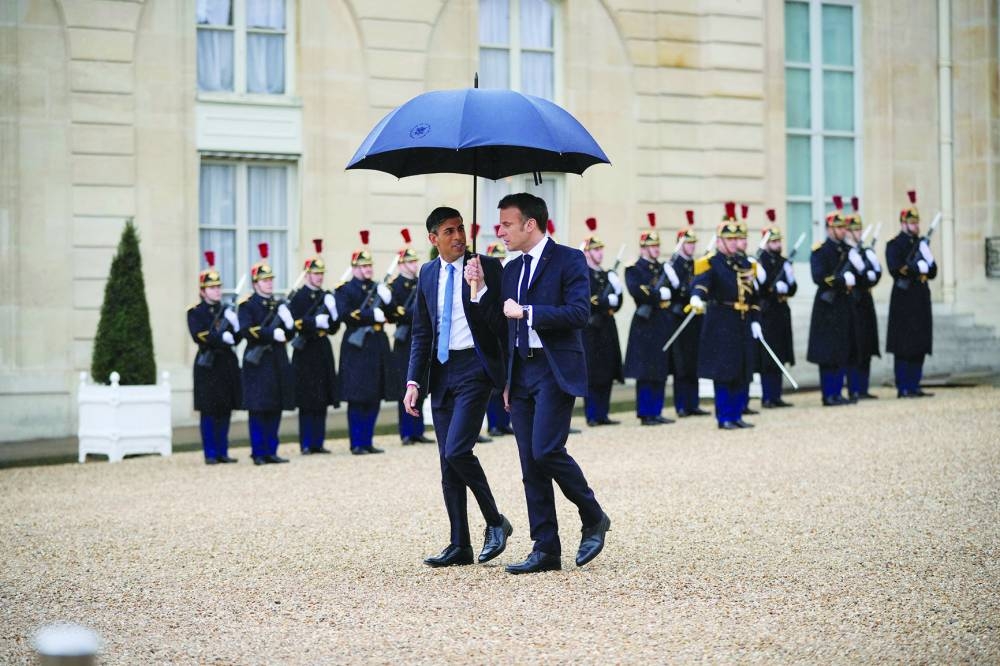British Prime Minister Rishi Sunak and French President Emmanuel Macron yesterday agreed a new pact to stop illegal cross-Channel migration after a summit in Paris aimed at overcoming years of Brexit tensions.
Both leaders hailed a new start in relations between the two neighbours, after intense talks in Paris which were also marked by expressions of unity in their support for Ukraine in fighting the Russian invasion.
It was the first UK-French summit in five years, after Sunak became prime minister in October following the stormy tenures of Boris Johnson and Liz Truss marked by rancorous relations with Paris.
The centrepiece of the new atmosphere yesterday was the deal to thwart illegal cross-Channel migration, a prime political priority for Sunak as he seeks to rescue the popularity of the ruling right-wing Conservative party.
London will step up funding to France over the next three years to total 541mn euros ($575mn), allowing the deployment of “hundreds” of extra French law enforcement officers along the Channel coast to stop the illegal migration, the British government said in a statement.
Macron said his talks with Sunak marked a “new start” while Sunak said it was “a new beginning, an entente renewed”.
“We’re writing a new chapter in this relationship,” Sunak added, acknowledging the relationship “has had its challenges in recent years”.
Under the deal, for the first time the UK will help fund a detention centre in France to enhance its ability to cope with the number of people being trafficked across the Channel.
“We don’t need to manage this problem, we need to break it,” said Sunak.
“And today, we have gone further than ever before to put an end to this disgusting trade in human life.”
The new funding from the UK this year is already more than double last year’s package worth over 70mn euros that increased the number of French police patrolling Channel shores.
Sunak is under fierce pressure at home to reduce the number of asylum seekers arriving in Britain, and this week unveiled legislation that critics said would make Britain an international outlaw on refugee rights.
“There is no one silver bullet to solve this problem. So the legislation we introduced this week is incredibly important, co-operation with the French is important, illegal migration enforcement at home is important,” Sunak explained as he travelled to Paris on the Eurostar train.
The United Nations’ children’s agency yesterday joined critics of the proposed law aimed at stopping migrants arriving by small boat, saying it was “deeply concerned” about its impact on minors.
Jon Sparkes, head of United Nations Children’s Fund in the UK, said the bill could deny children and families the chance to seek safety in the UK. “For almost all children fleeing conflict and persecution there is no safe and legal route into the UK,” Sparkes said.
The bill plans to ban people who have arrived in the country illegally from seeking asylum. Instead they will be detained and sent to a third country deemed safe. Exceptions would be made for minors, but only if they were unaccompanied.
Sparkes said the bill was published without an assessment of its impact on children, leaving many critical questions unanswered.
“It is not clear how this bill will be compatible with existing UK government duties to act in the best interests of the child, and it is questionable whether the removal of a child to a third country, following a perilous journey to the UK, could ever be in their best interest,” he said.
Speaking on Ukraine, Britain and France said that they would jointly train Ukrainian marines. The two leaders said they were in complete agreement on helping Ukraine to defeat the Russian invasion and it should be Kyiv that chooses when any peace talks start.
“We want Ukraine to win this war. We are absolutely united on this,” said Sunak.
Macron’s distrust of Brexit figurehead Johnson was barely concealed, while Truss said she didn’t know whether the French leader was a “friend or foe” during her campaign to become prime minister.
But both sides now see an opportunity to reset the “Entente Cordiale” between Western Europe’s two nuclear powers.
“I hope it can be the start of a stronger relationship between us and it’s a privilege to be able to play a part in that,” Sunak told reporters as he travelled over.
As part of the British government’s post-Brexit outreach, the summit paves the way for King Charles III to make France his first foreign destination when he heads there on a state visit at the end of March.

French President Emmanuel Macron, uses an umbrella to protect Britain's Prime Minister Rishi Sunak after a French-British summit at the Elysee Palace in Paris, France, yesterday.
